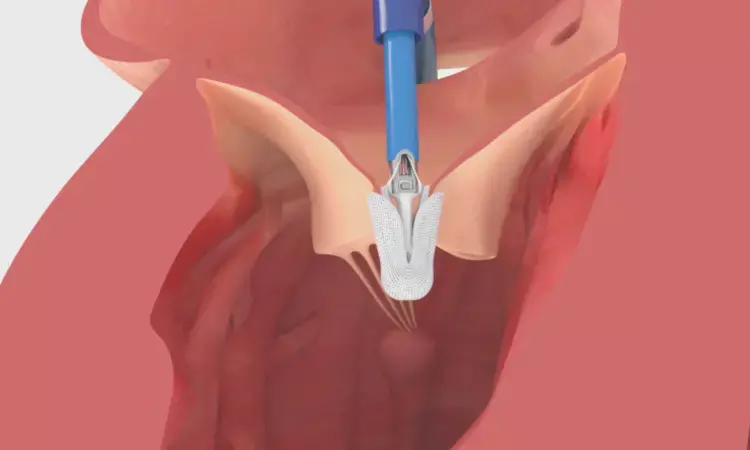- Home
- Medical news & Guidelines
- Anesthesiology
- Cardiology and CTVS
- Critical Care
- Dentistry
- Dermatology
- Diabetes and Endocrinology
- ENT
- Gastroenterology
- Medicine
- Nephrology
- Neurology
- Obstretics-Gynaecology
- Oncology
- Ophthalmology
- Orthopaedics
- Pediatrics-Neonatology
- Psychiatry
- Pulmonology
- Radiology
- Surgery
- Urology
- Laboratory Medicine
- Diet
- Nursing
- Paramedical
- Physiotherapy
- Health news
- Fact Check
- Bone Health Fact Check
- Brain Health Fact Check
- Cancer Related Fact Check
- Child Care Fact Check
- Dental and oral health fact check
- Diabetes and metabolic health fact check
- Diet and Nutrition Fact Check
- Eye and ENT Care Fact Check
- Fitness fact check
- Gut health fact check
- Heart health fact check
- Kidney health fact check
- Medical education fact check
- Men's health fact check
- Respiratory fact check
- Skin and hair care fact check
- Vaccine and Immunization fact check
- Women's health fact check
- AYUSH
- State News
- Andaman and Nicobar Islands
- Andhra Pradesh
- Arunachal Pradesh
- Assam
- Bihar
- Chandigarh
- Chattisgarh
- Dadra and Nagar Haveli
- Daman and Diu
- Delhi
- Goa
- Gujarat
- Haryana
- Himachal Pradesh
- Jammu & Kashmir
- Jharkhand
- Karnataka
- Kerala
- Ladakh
- Lakshadweep
- Madhya Pradesh
- Maharashtra
- Manipur
- Meghalaya
- Mizoram
- Nagaland
- Odisha
- Puducherry
- Punjab
- Rajasthan
- Sikkim
- Tamil Nadu
- Telangana
- Tripura
- Uttar Pradesh
- Uttrakhand
- West Bengal
- Medical Education
- Industry
Transcatheter tricuspid valve replacement effective in patients with severe tricuspid regurgitation: Study

A new study published in the New England Journal of Medicine showed that improvements in symptoms and quality of life were the main reasons why transcatheter tricuspid-valve replacement outperformed medical treatment alone for patients with severe tricuspid regurgitation in terms of the key composite outcome.
Even though it has been consistently demonstrated that severe tricuspid regurgitation (TR) is linked to a worse prognosis and a higher death rate, it is still undertreated and treated conservatively. For the following reasons, all patients with severe TR should have access to transcatheter repair and replacement technologies, which are evolving to meet this significant unmet clinical need. A higher risk of mortality and incapacitating symptoms are linked to severe tricuspid regurgitation. Thus, information on the results of percutaneous transcatheter tricuspid valve replacement were required. Therefore, Rebecca Hahn and team conducted this study in order to get an overall effectiveness of percutaneous transcatheter tricuspid-valve replacement in individuals with regurgitation.
This research randomly allocated 400 patients with serious symptomatic tricuspid regurgitation in a 2:1 ratio to either medical therapy alone (control group) or transcatheter tricuspid-valve replacement with medical therapy (valve-replacement group) in this worldwide multicenter study. The following were the hierarchical composite primary outcomes: hospitalization for heart failure, postindex tricuspid-valve intervention, implantation of a right ventricular assist device or heart transplant, all-cause mortality, improvement of at least 10 points on the Kansas City Cardiomyopathy Questionnaire overall summary (KCCQ-OS), improvements of at least one New York Heart Association (NYHA) functional class, and improvement of at least 30 meters on the 6-minute walk distance. By comparing every potential patient pair, beginning with the initial event in the hierarchy, a win ratio was determined for the primary result.
A total of 133 patients were placed in the control group and 267 in the valve replacement group. After a year, the win ratio in favor of replacing the valve was 2.02. In patient pair comparisons, the valve-replacement group outperformed the control group in terms of postindex tricuspid-valve intervention, mortality from any cause, and progress in the KCCQ-OS score, NYHA class, and 6-minute walk length.
The yearly average of hospitalization for heart failure was lower in the valve-replacement group than in the control group. 15.4% of the valve-replacement group and 5.3% of the control group experienced severe bleeding; 17.4% and 2.3%, respectively, had new permanent pacemakers installed. Overall, transcatheter tricuspid valve replacement outperformed medical treatment in patients with severe tricuspid regurgitation.
Source:
Hahn, R. T., Makkar, R., Thourani, V. H., Makar, M., Sharma, R. P., Haeffele, C., Davidson, C. J., Narang, A., O’Neill, B., Lee, J., Yadav, P., Zahr, F., Chadderdon, S., Eleid, M., Pislaru, S., Smith, R., Szerlip, M., Whisenant, B., Sekaran, N. K., … Kodali, S. K. (2024). Transcatheter Valve Replacement in Severe Tricuspid Regurgitation. In New England Journal of Medicine. Massachusetts Medical Society. https://doi.org/10.1056/nejmoa2401918
Neuroscience Masters graduate
Jacinthlyn Sylvia, a Neuroscience Master's graduate from Chennai has worked extensively in deciphering the neurobiology of cognition and motor control in aging. She also has spread-out exposure to Neurosurgery from her Bachelor’s. She is currently involved in active Neuro-Oncology research. She is an upcoming neuroscientist with a fiery passion for writing. Her news cover at Medical Dialogues feature recent discoveries and updates from the healthcare and biomedical research fields. She can be reached at editorial@medicaldialogues.in
Dr Kamal Kant Kohli-MBBS, DTCD- a chest specialist with more than 30 years of practice and a flair for writing clinical articles, Dr Kamal Kant Kohli joined Medical Dialogues as a Chief Editor of Medical News. Besides writing articles, as an editor, he proofreads and verifies all the medical content published on Medical Dialogues including those coming from journals, studies,medical conferences,guidelines etc. Email: drkohli@medicaldialogues.in. Contact no. 011-43720751


